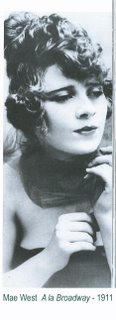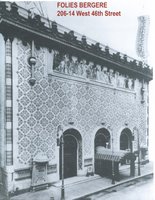
________________________________
Source:http://maewest.blogspot.com/atom.xml
Mae West
• • Photo • Mae West •
NYC
Mae West.

Mae West. . . Mae West. . . Mae West. . . This site is all about the actress MAE WEST [1893-1980] - - and the ANNUAL MAE WEST GALA. More than just a movie star was MAE WEST. Come up and see her!


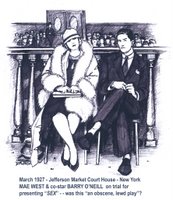


 Applause for Patrick Horne, a 27-year-old filmmaker from North Carolina who may not yet know how to spell "Chase & Sanborn," but who revived the famous 1937 radio skit from Edgar Bergen's program in a new 18-minute film. And a Christian actress Patrick Horne cast viewed ONE — — yes, just one Mae West film to prepare for her role as the temptress Eve in Arch Obler's "Garden of Eden" parody that got the Brooklyn Bombshell banned from the airwaves. Author Arch Obler was neither fined nor banned, however. Perhaps thinking of her hometown, Mae West tells the serpent, "I feel like doin' a Big Apple." Mae's suggestive adlibbing with ventriloquist dummy Charlie McCarthy also outraged the advertisers, who began firing up phonecalls before the 60-minute segment ended. Is this section included in the 18-minute adaptation? Stay tuned.
Applause for Patrick Horne, a 27-year-old filmmaker from North Carolina who may not yet know how to spell "Chase & Sanborn," but who revived the famous 1937 radio skit from Edgar Bergen's program in a new 18-minute film. And a Christian actress Patrick Horne cast viewed ONE — — yes, just one Mae West film to prepare for her role as the temptress Eve in Arch Obler's "Garden of Eden" parody that got the Brooklyn Bombshell banned from the airwaves. Author Arch Obler was neither fined nor banned, however. Perhaps thinking of her hometown, Mae West tells the serpent, "I feel like doin' a Big Apple." Mae's suggestive adlibbing with ventriloquist dummy Charlie McCarthy also outraged the advertisers, who began firing up phonecalls before the 60-minute segment ended. Is this section included in the 18-minute adaptation? Stay tuned.
 In 1913, as MAE WEST headed towards her 20th birthday, she was mastering the trick of taking a word or a phrase and inflecting it with something "sextra." Here are lyrics written by Alfred Bryan:
In 1913, as MAE WEST headed towards her 20th birthday, she was mastering the trick of taking a word or a phrase and inflecting it with something "sextra." Here are lyrics written by Alfred Bryan:


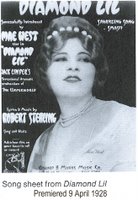

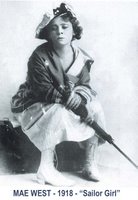






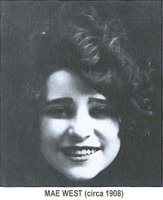
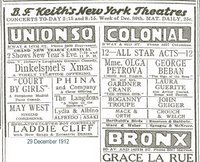
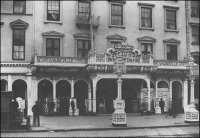

 In June 1926 Ned Wayburn staged a "$100 Show for $2" at an enormous amphitheatre, the Polo Grounds [8th Avenue + 155th Street] for the Benefit of the United Jewish Campaign.
In June 1926 Ned Wayburn staged a "$100 Show for $2" at an enormous amphitheatre, the Polo Grounds [8th Avenue + 155th Street] for the Benefit of the United Jewish Campaign.


• • Frankie and Johnny • •
Frankie and Johnny were sweethearts
O Lordy how they did love!
Swore to be true to each other
Just as true as the stars above
He was her man
He wouldn't do her no wrong.
•
Frankie went down to the corner
Just to get a bucket of beer
She said to the old bartender,
"Say, has my lovin' Johnny been here?
He's my man. He wouldn't do me no wrong."
•
Well, I ain't gonna tell you no story
I ain't gonna tell you no lie
Johnny left here 'bout an hour ago
With a gal named Nellie Bly
If he's your man, he's doin' you wrong . . .




